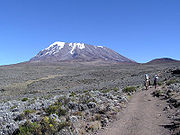Scientists: Snow on Mt. Kilimanjaro to melt in twenty years
Scientists at the Ohio State University predicted that the ice sheets of Mt. Kilimanjaro, Africa’s tallest mountain peak, will melt in the next twenty years due to global warming.
The ice that was present in 1912 gradually decreased by 85 per cent by 2000, and by 2007 another 26 per cent of the amount in 2000. This was the first time that the volume of the ice in Kilimanjaro was measured. The tests were conducted by Lonnie Thompson, a professor at Ohio State University.
“The fact that so many glaciers throughout the tropics and subtropics are showing similar responses suggests an underlying common cause,” Thompson said.
Change in cloudiness and weather could have also been factors in the retreat of the ice, especially in recent decades, scientists said. These findings were first published in the journal proceedings of United States National Academy of Sciences (NAS) on Monday.
























